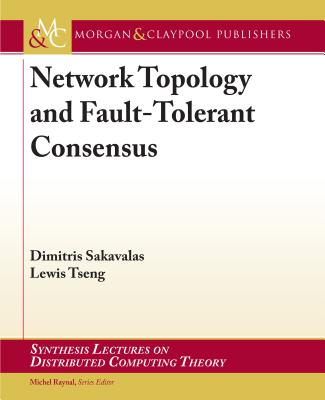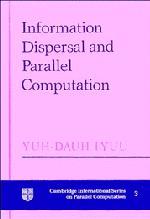Distributed Computing: Fundamentals, Simulations, and Advanced Topics
暫譯: 分散式計算:基礎、模擬與進階主題
Hagit Attiya, Jennifer Welch
- 出版商: Wiley
- 出版日期: 2004-03-25
- 售價: $1,020
- 貴賓價: 9.8 折 $1,000
- 語言: 英文
- 頁數: 432
- 裝訂: Hardcover
- ISBN: 0471453242
- ISBN-13: 9780471453246
已絕版
買這商品的人也買了...
-
 $788High Availability: Design, Techniques and Processes (Hardcover)
$788High Availability: Design, Techniques and Processes (Hardcover) -
 $495The Manager Pool: Patterns for Radical Leadership
$495The Manager Pool: Patterns for Radical Leadership -
 Professional JSP Tag Libraries (Paperback)
Professional JSP Tag Libraries (Paperback)$1,840$1,748 -
 System Software: An Introduction to Systems Programming, 3/e (IE-Paperback)
System Software: An Introduction to Systems Programming, 3/e (IE-Paperback)$980$960 -
 電腦網路 (Computer Networks, 4/e)
電腦網路 (Computer Networks, 4/e)$800$760 -
 鳥哥的 Linux 私房菜─基礎學習篇增訂版
鳥哥的 Linux 私房菜─基礎學習篇增訂版$560$476 -
 Word 2003 私房書
Word 2003 私房書$299$254 -
 Concurrent and Distributed Computing in Java (Hardcover)
Concurrent and Distributed Computing in Java (Hardcover)$2,980$2,831 -
 人月神話:軟體專案管理之道 (20 週年紀念版)(The Mythical Man-Month: Essays on Software Engineering, Anniversary Edition, 2/e)
人月神話:軟體專案管理之道 (20 週年紀念版)(The Mythical Man-Month: Essays on Software Engineering, Anniversary Edition, 2/e)$480$379 -
 JSP 2.0 技術手冊
JSP 2.0 技術手冊$750$593 -
 建構嵌入式 Linux 系統
建構嵌入式 Linux 系統$780$616 -
 CCNA 認證教戰手冊 Exam 640-801 (CCNA Cisco Certified Network Associate Study Guide, 4/e)
CCNA 認證教戰手冊 Exam 640-801 (CCNA Cisco Certified Network Associate Study Guide, 4/e)$780$663 -
 Visual Basic 6 初學指引
Visual Basic 6 初學指引$480$408 -
 Computer Organization and Design: The Hardware/Software Interface, 3/e(IE) (美國版ISBN:1558606041)
Computer Organization and Design: The Hardware/Software Interface, 3/e(IE) (美國版ISBN:1558606041)$1,200$1,176 -
 Linux 程式設計教學手冊
Linux 程式設計教學手冊$780$616 -
 Google Hacks, 2/e (Paperback)
Google Hacks, 2/e (Paperback)$1,060$1,007 -
 計算機組織與設計 (Computer Organization and Design: The Hardware/Software Interface, 3/e)
計算機組織與設計 (Computer Organization and Design: The Hardware/Software Interface, 3/e)$680$646 -
 SIP 會談啟始協議操典
SIP 會談啟始協議操典$680$340 -
 Java:由初學邁向網路程式設計
Java:由初學邁向網路程式設計$580$493 -
 Compilers: Principles, Techniques, and Tools, 2/e (IE-Paperback)
Compilers: Principles, Techniques, and Tools, 2/e (IE-Paperback)$1,200$1,176 -
 深入淺出物件導向分析與設計 (Head First Object-Oriented Analysis and Design)
深入淺出物件導向分析與設計 (Head First Object-Oriented Analysis and Design)$880$695 -
 資料結構─使用 C 語言實作
資料結構─使用 C 語言實作$560$437 -
 網頁程式設計─HTML、JavaScript、CSS、XHTML、Ajax, 2/e
網頁程式設計─HTML、JavaScript、CSS、XHTML、Ajax, 2/e$480$379 -
 Java 物件導向程式設計
Java 物件導向程式設計$620$527 -
 PCDIY 2009 電腦選購、組裝、應用
PCDIY 2009 電腦選購、組裝、應用$450$383
相關主題
商品描述
Description:
"This text provides a well-written, thoroughly thought-out introduction to
the theory of distributed computing. For the first time, the fundamentals of
distributed computing will be accessible to nonspecialists."
–Maurice
Herlihy
Computer Science Department, Brown University, on the first edition
A Clear Path To Understanding Distributed Computing
The explosive growth of distributed computing systems makes understanding them imperative. To make this notoriously difficult subject accessible, Distributed Computing: Fundamentals, Simulations, and Advanced Topics; Second Edition, provides a solid introduction to the mathematical foundations and theory of distributed computing, highlighting common themes and basic techniques.
The authors present the fundamental issues underlying the design of distributed systems–communication, coordination, synchronization, and uncertainty–as well as fundamental algorithmic concepts and lower-bound techniques. The book’s unifying approach emphasizes the similarities between different models and explains inherent discrepancies between them. Focusing on ideas rather than optimizations, the book discusses major models of distributed computing, including:
- Message passing and shared memory communication; synchronous and asynchronous timing models, failures, proofs of correctness, and lower bounds
- Leader election, mutual exclusion, and consensus
- Causality of events and clock synchronization
- Simulations between models of distributed computing
- Advanced topics including randomization, the wait-free hierarchy, asynchronous solvability, and failure detectors
With new material on such subjects as fast mutual exclusion and queue locks, and improved coverage of existing material throughout, this Second Edition will serve as a comprehensive textbook for graduate and advanced undergraduate students, and as a key reference for researchers and practicing professionals
Table of Contents:
. Introduction.
PART I: FUNDAMENTALS.
2. Basic Algorithms in Message-Passing Systems.
3. Leader Election in Rings.
4. Mutual Exclusion in Shared Memory.
5. Fault-Tolerant Consensus.
6. Causality and Time.
PART II: SIMULATIONS.
7. A Formal Model for Simulations.
8. Broadcast and Multicast.
9. Distributed Shared Memory.
10. Fault-Tolerant Simulations of Read/Write Objects.
11. Simulating Synchrony.
12. Improving the Fault Tolerance of Algorithms.
13. Fault-Tolerant Clock Synchronization.
PART III: ADVANCED TOPICS.
14. Randomization.
15. Wait-Free Simulations of Arbitrary Objects.
16. Problems Solvable in Asynchronous Systems.
17. Solving Consensus in Eventually Stable Systems.
References.
Index
商品描述(中文翻譯)
**描述:**
「這本書提供了一個寫得很好、經過深思熟慮的分散式計算理論介紹。對於非專業人士來說,分散式計算的基本原理將首次變得可接觸。」
–Maurice Herlihy
布朗大學計算機科學系,第一版評價
**理解分散式計算的清晰途徑**
分散式計算系統的爆炸性增長使得理解它們變得至關重要。為了使這個著名的困難主題變得可接觸,《分散式計算:基礎、模擬與進階主題;第二版》提供了對分散式計算的數學基礎和理論的堅實介紹,突顯了共同主題和基本技術。
作者提出了設計分散式系統的基本問題——通信、協調、同步和不確定性——以及基本的算法概念和下界技術。這本書的統一方法強調了不同模型之間的相似性,並解釋了它們之間的固有差異。該書專注於思想而非優化,討論了分散式計算的主要模型,包括:
- 消息傳遞和共享記憶體通信;同步和非同步時間模型、故障、正確性證明和下界
- 領導者選舉、互斥和共識
- 事件的因果關係和時鐘同步
- 分散式計算模型之間的模擬
- 進階主題,包括隨機化、無等待層級、非同步可解性和故障檢測器
本第二版新增了有關快速互斥和佇列鎖的材料,並改善了現有材料的覆蓋,將作為研究生和高年級本科生的綜合教科書,以及研究人員和實務專業人士的關鍵參考資料。
**目錄:**
. 引言。
**第一部分:基礎。**
2. 消息傳遞系統中的基本算法。
3. 環中的領導者選舉。
4. 共享記憶體中的互斥。
5. 容錯共識。
6. 因果關係與時間。
**第二部分:模擬。**
7. 模擬的正式模型。
8. 廣播和多播。
9. 分散式共享記憶體。
10. 讀/寫對象的容錯模擬。
11. 模擬同步。
12. 改善算法的容錯性。
13. 容錯時鐘同步。
**第三部分:進階主題。**
14. 隨機化。
15. 任意對象的無等待模擬。
16. 在非同步系統中可解的問題。
17. 在最終穩定系統中解決共識。
參考文獻。
索引












